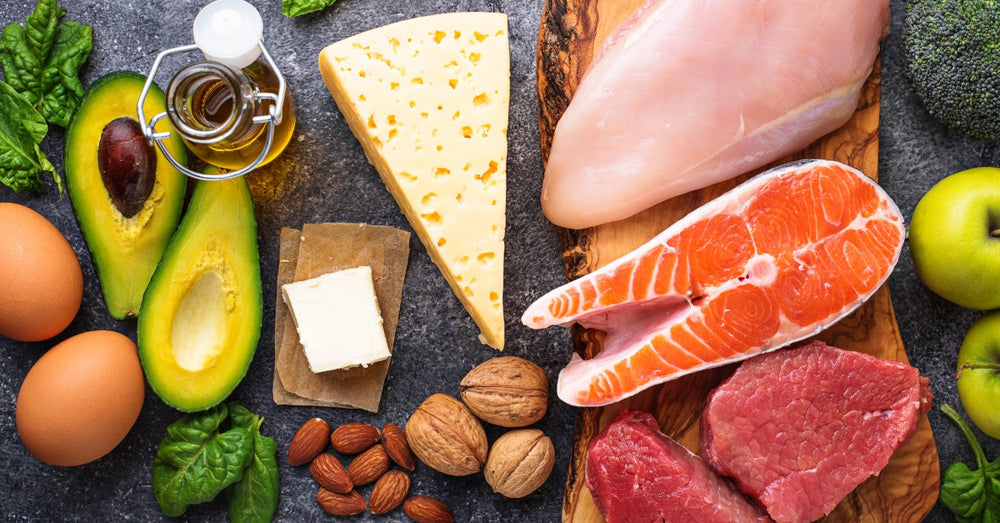Vous suivez un régime cétogène ? À ne pas manquer

Lorsqu’un patient demande conseil à un naturopathe, vous pouvez supposer sans risque qu’à un moment donné, nous discuterons de régime alimentaire.
Nous sommes vraiment ce que nous mangeons, mais l'alimentation a un impact plus important sur notre santé qu'on ne le pense parfois. Alors, comment s'y retrouver parmi les nombreuses modes et recommandations alimentaires ? Et comment savoir quelle habitude alimentaire est la « meilleure » pour nous ?
Mon rôle principal dans la pratique de la médecine naturopathique est celui d'éducateur, et dans cet esprit, j'aborderai et évaluerai un exemple extrêmement populaire de ces régimes à la mode que vous voyez sûrement PARTOUT : le régime cétogène.
(Je commence toujours par une mise en garde : consultez toujours votre naturopathe avant d'effectuer des changements alimentaires importants. C'est toujours une bonne idée d'avoir le soutien d'un professionnel.)
Le régime cétogène (ou « keto ») est un régime riche en graisses, riche en protéines et pauvre en glucides. Il est particulièrement étudié et recherché chez les personnes épileptiques et autres personnes souffrant d'autres maladies idiopathiques liées aux crises d'épilepsie. En limitant les glucides, notre corps est finalement contraint d'utiliser les graisses comme source d'énergie. Lorsque les graisses sont brûlées, le foie les décompose en acides gras et en corps cétoniques. Les cétones peuvent atteindre le cerveau, remplaçant ainsi sa source d'énergie habituelle (le glucose, c'est-à-dire le sucre). Il a été démontré qu'elles réduisent la fréquence des crises d'épilepsie, en particulier chez les enfants.
Cela dit, le régime cétogène est devenu populaire auprès du grand public pour diverses raisons. Les glucides ont longtemps été décriés, mais l'idée de « régimes pauvres en glucides » a véritablement pris son essor au début des années 70, lorsque le Dr Robert Atkins a mis au point le régime Atkins. Nombre de ceux qui l'ont suivi ont constaté ses bienfaits : perte de poids, notamment. Mais, plus important encore, les patients ont constaté une stabilisation de leur glycémie, en particulier ceux souffrant de diabète de type II (dont certains ont vu leur diagnostic complètement inversé).
Tout va bien, n'est-ce pas ? MAIS il existe aussi des raisons pour lesquelles ce régime ne doit être suivi que sous la supervision d'un médecin et seulement pendant de courtes périodes.
Si vous n’avez pas l’habitude de manger beaucoup de fruits et de légumes alcalins, votre alimentation peut rapidement devenir surchargée de protéines riches en graisses.
Lorsqu'on privilégie les aliments cétogènes, on se concentre facilement sur les produits laitiers et la viande, car ils sont faciles à consommer et beaucoup de nos (comprenez : MES) aliments préférés proviennent de ces deux groupes alimentaires. Le problème avec ces aliments prêts à consommer, bien qu'ils favorisent la conversion des graisses en énergie, est qu'avec le temps, ils créent un environnement acide dans l'organisme.
De plus, négliger les fruits et légumes frais pousse le corps vers un état de pH encore plus acide.
Lorsque le pH de notre corps change même légèrement, il puise dans nos ressources pour corriger rapidement le déséquilibre du pH.
Lorsque nous entrons dans cet état d'acidose métabolique, nous perdons des minéraux essentiels tels que le calcium, le magnésium et le potassium, le plus souvent présents dans nos os. C'est pourquoi nous observons souvent une perte de densité osseuse et une alimentation trop acide, souvent associées. Cette acidose peut également entraîner des inflammations et des maladies chroniques. La fatigue, ainsi que des facteurs émotionnels et de l'humeur, entrent également en jeu lors du régime cétogène, et peuvent être attribués à sa tendance à la formation d'acide.
Il est intéressant de noter qu'une étude récente publiée dans Frontiers in Endocrinology a révélé que les athlètes suivant un régime cétogène développaient des signes précoces de perte osseuse. Dans cette étude, les chercheurs ont divisé un groupe de 30 marcheurs athlétiques en deux groupes : l'un suivait un régime cétogène typique riche en graisses, tandis que l'autre suivait un régime riche en glucides (non cétogène). À la fin de l'étude, le groupe suivant le régime cétogène présentait des marqueurs de dégradation osseuse plus élevés, contrairement au groupe suivant le régime riche en glucides (1).
En résumé : vous devez fournir au corps de nombreux aliments alcalinisants pour contrer les tendances acides du régime cétogène.
Un moyen infaillible de protéger vos os – et votre corps tout entier – des effets d'une alimentation trop acide est de consommer des aliments végétaux alcalinisants. Je comprends que manger 8 tasses de chou frisé ne convienne pas toujours à tout le monde, c'est pourquoi je conseille toujours de prendre un complément de légumes verts d'excellente qualité pour soutenir vos objectifs tout en protégeant et en nourrissant votre corps.
Le complément alimentaire vert que je recommande est greens+ . Sa formule exceptionnelle à base de graminées, d'herbes et de superaliments est reconnue et a fait l'objet de recherches approfondies. Des études ont d'ailleurs été menées sur ce produit pour évaluer ses effets sur la lutte contre l'acidité. Une dose de greens+ pendant 14 jours a entraîné une diminution de l'alcalinité urinaire par deux, confirmant ainsi sans équivoque son efficacité dans l'amélioration de l'alcalinité humaine (2). De tels effets fournissent au corps le soutien alcalin dont il a besoin lorsqu’il mange du céto.
Un régime cétogène élevé qui perd de vue la consommation de fruits et légumes expose également l'environnement intestinal à un risque de dysbiose, un déséquilibre dans les bactéries saines résidant dans le tractus intestinal. Fermented Organic Gut Superfoods+ fournit un soutien en phytonutriments alcalinisants, à partir de 22 superaliments biologiques à base de plantes entièrement fermentés et comprend des prébiotiques pour nourrir une écologie intestinale saine.
Alors, abandonnez le régime cétogène, mais privilégiez les légumes. Consommez des protéines, mangez de l'avocat, mais veillez à ce que votre alimentation et vos compléments alimentaires tiennent compte de l'importance d'un pH sain, des phytonutriments et de l'équilibre intestinal. Que recommander d'autre à mes patients ? Je dirai simplement que mon mantra de pratique est : tout avec modération.
Les informations fournies par la Dre Katherine Kremblewski, ND, sont de nature générale et ne sauraient se substituer à une consultation chez un naturopathe ou un médecin de famille. Ces conseils sont fournis à titre indicatif uniquement pour permettre aux personnes de discuter de leur état de santé avec leur professionnel de la santé. Consultez toujours votre naturopathe ou votre professionnel de la santé agréé.
Références :
Nous sommes vraiment ce que nous mangeons, mais l'alimentation a un impact plus important sur notre santé qu'on ne le pense parfois. Alors, comment s'y retrouver parmi les nombreuses modes et recommandations alimentaires ? Et comment savoir quelle habitude alimentaire est la « meilleure » pour nous ?
Mon rôle principal dans la pratique de la médecine naturopathique est celui d'éducateur, et dans cet esprit, j'aborderai et évaluerai un exemple extrêmement populaire de ces régimes à la mode que vous voyez sûrement PARTOUT : le régime cétogène.
(Je commence toujours par une mise en garde : consultez toujours votre naturopathe avant d'effectuer des changements alimentaires importants. C'est toujours une bonne idée d'avoir le soutien d'un professionnel.)
Qu'est-ce que le régime cétogène ?
Le régime cétogène (ou « keto ») est un régime riche en graisses, riche en protéines et pauvre en glucides. Il est particulièrement étudié et recherché chez les personnes épileptiques et autres personnes souffrant d'autres maladies idiopathiques liées aux crises d'épilepsie. En limitant les glucides, notre corps est finalement contraint d'utiliser les graisses comme source d'énergie. Lorsque les graisses sont brûlées, le foie les décompose en acides gras et en corps cétoniques. Les cétones peuvent atteindre le cerveau, remplaçant ainsi sa source d'énergie habituelle (le glucose, c'est-à-dire le sucre). Il a été démontré qu'elles réduisent la fréquence des crises d'épilepsie, en particulier chez les enfants.
Cela dit, le régime cétogène est devenu populaire auprès du grand public pour diverses raisons. Les glucides ont longtemps été décriés, mais l'idée de « régimes pauvres en glucides » a véritablement pris son essor au début des années 70, lorsque le Dr Robert Atkins a mis au point le régime Atkins. Nombre de ceux qui l'ont suivi ont constaté ses bienfaits : perte de poids, notamment. Mais, plus important encore, les patients ont constaté une stabilisation de leur glycémie, en particulier ceux souffrant de diabète de type II (dont certains ont vu leur diagnostic complètement inversé).
Tout va bien, n'est-ce pas ? MAIS il existe aussi des raisons pour lesquelles ce régime ne doit être suivi que sous la supervision d'un médecin et seulement pendant de courtes périodes.
Comment le régime cétogène acidifie-t-il le corps ?
Si vous n’avez pas l’habitude de manger beaucoup de fruits et de légumes alcalins, votre alimentation peut rapidement devenir surchargée de protéines riches en graisses.
Lorsqu'on privilégie les aliments cétogènes, on se concentre facilement sur les produits laitiers et la viande, car ils sont faciles à consommer et beaucoup de nos (comprenez : MES) aliments préférés proviennent de ces deux groupes alimentaires. Le problème avec ces aliments prêts à consommer, bien qu'ils favorisent la conversion des graisses en énergie, est qu'avec le temps, ils créent un environnement acide dans l'organisme.
De plus, négliger les fruits et légumes frais pousse le corps vers un état de pH encore plus acide.
Lorsque le pH de notre corps change même légèrement, il puise dans nos ressources pour corriger rapidement le déséquilibre du pH.
Lorsque nous entrons dans cet état d'acidose métabolique, nous perdons des minéraux essentiels tels que le calcium, le magnésium et le potassium, le plus souvent présents dans nos os. C'est pourquoi nous observons souvent une perte de densité osseuse et une alimentation trop acide, souvent associées. Cette acidose peut également entraîner des inflammations et des maladies chroniques. La fatigue, ainsi que des facteurs émotionnels et de l'humeur, entrent également en jeu lors du régime cétogène, et peuvent être attribués à sa tendance à la formation d'acide.
Il est intéressant de noter qu'une étude récente publiée dans Frontiers in Endocrinology a révélé que les athlètes suivant un régime cétogène développaient des signes précoces de perte osseuse. Dans cette étude, les chercheurs ont divisé un groupe de 30 marcheurs athlétiques en deux groupes : l'un suivait un régime cétogène typique riche en graisses, tandis que l'autre suivait un régime riche en glucides (non cétogène). À la fin de l'étude, le groupe suivant le régime cétogène présentait des marqueurs de dégradation osseuse plus élevés, contrairement au groupe suivant le régime riche en glucides (1).
En résumé : vous devez fournir au corps de nombreux aliments alcalinisants pour contrer les tendances acides du régime cétogène.
Soutenir votre corps lorsque vous suivez le régime cétogène
Un moyen infaillible de protéger vos os – et votre corps tout entier – des effets d'une alimentation trop acide est de consommer des aliments végétaux alcalinisants. Je comprends que manger 8 tasses de chou frisé ne convienne pas toujours à tout le monde, c'est pourquoi je conseille toujours de prendre un complément de légumes verts d'excellente qualité pour soutenir vos objectifs tout en protégeant et en nourrissant votre corps.
Le complément alimentaire vert que je recommande est greens+ . Sa formule exceptionnelle à base de graminées, d'herbes et de superaliments est reconnue et a fait l'objet de recherches approfondies. Des études ont d'ailleurs été menées sur ce produit pour évaluer ses effets sur la lutte contre l'acidité. Une dose de greens+ pendant 14 jours a entraîné une diminution de l'alcalinité urinaire par deux, confirmant ainsi sans équivoque son efficacité dans l'amélioration de l'alcalinité humaine (2). De tels effets fournissent au corps le soutien alcalin dont il a besoin lorsqu’il mange du céto.
Un régime cétogène élevé qui perd de vue la consommation de fruits et légumes expose également l'environnement intestinal à un risque de dysbiose, un déséquilibre dans les bactéries saines résidant dans le tractus intestinal. Fermented Organic Gut Superfoods+ fournit un soutien en phytonutriments alcalinisants, à partir de 22 superaliments biologiques à base de plantes entièrement fermentés et comprend des prébiotiques pour nourrir une écologie intestinale saine.
Alors, abandonnez le régime cétogène, mais privilégiez les légumes. Consommez des protéines, mangez de l'avocat, mais veillez à ce que votre alimentation et vos compléments alimentaires tiennent compte de l'importance d'un pH sain, des phytonutriments et de l'équilibre intestinal. Que recommander d'autre à mes patients ? Je dirai simplement que mon mantra de pratique est : tout avec modération.
Les informations fournies par la Dre Katherine Kremblewski, ND, sont de nature générale et ne sauraient se substituer à une consultation chez un naturopathe ou un médecin de famille. Ces conseils sont fournis à titre indicatif uniquement pour permettre aux personnes de discuter de leur état de santé avec leur professionnel de la santé. Consultez toujours votre naturopathe ou votre professionnel de la santé agréé.
Références :
- https://www.frontiersin.org/articles/10.3389/fendo.2019.00880/full
- Berardi JB, Logan AC, Rao V. Un complément alimentaire à base de plantes augmente le pH urinaire. J Int Soc Sports Nutr 2008 6 novembre ;5:20-7.

















































